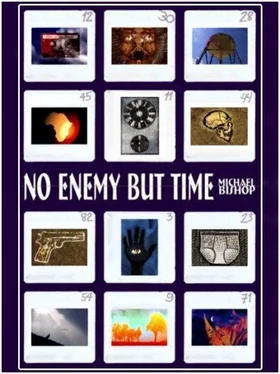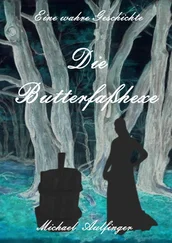The sentence?
Why, “I love you,” of course. I do not record it as Helen actually pronounced it because such a transcription would give the sentence a comic cast. Although I am not totally without humor regarding my relationship with Helen, in this instance I do not like to provoke your laughter. All of us cherish certain memories, and Helen’s distinctive phrasing of the words “I love you” is one of mine.
Pensacola, Florida
July 1985
Joshuacareered through five o’clock traffic on his battered red Kawasaki, leaning first this way and then that, the beach a stinging blur of whiteness to his left and, when too many automobiles and campers blocked the asphalt, the sandy right-hand shoulder of the highway—his private corridor to Pensacola. He was dirty, sweat and paint-stained, but if he tried to stop by the trailer for a change of clothes and a bite to eat, he would probably miss Blair’s arrival at the auditorium. He had to get there not merely in time to hear the Great Man’s opening remarks, but early enough to waylay him outside the building and let him know that Blair was not the only expert on East African Pleistocene ecology in the Florida panhandle.
Joshua Kampa—a.k.a. John-John Monegal—was another, an expert with no formal training but a great deal of eyewitness experience. Indeed, he had convinced himself that his entire previous life had been pointing him toward this meeting with Blair.
Alistair Patrick Blair, the noted hominid paleontologist from the African state of Zarakal.
Weaving in and out of traffic, Joshua repeated the name almost as if it were an incantation, a mantra: Ali stair Patrick Blair , Ali stair Patrick Blair , Ali stair Patrick Blair … By repeating the name to himself he convinced himself of the reality of the man’s visit and of the inevitability of his meeting Blair. The chant emptied his mind of every distraction, every possible impediment to his goal. The Kawasaki, at the bidding of some implacable Higher Power, was directing itself to Pensacola….
Three days ago Joshua had read in the News-Journal that Blair was going to speak tonight at one of the local high schools. To raise funds for his researches at Lake Kiboko in the Northwest Frontier District of Zarakal, he was in the United States under the auspices of the American Geographic Foundation for a series of public lectures. This stop in Pensacola, a city not on his original itinerary, was reputedly owing to his friendship with an American military man who had once visited the Lake Kiboko digs with a contingent from the United States embassy in Marakoi, Zarakal’s capital. Whatever the rationale, Alistair Patrick Blair was in northern Florida, almost within shouting distance even now, and soon he and Joshua would be face to face on the walkway outside the auditorium.
After all, how often did a world-renowned authority on human evolution—not to mention Zarakal’s only white cabinet minister—condescend to show his slides and deliver his spiel to an audience of Escambia Countians? Never before, the paper had said. Blair had visited Miami before, but never Pensacola, and Joshua shot toward this rendezvous like a madman.
For twelve years, ever since he had begun to record his spirit-traveling episodes on tape, Joshua had read and thoroughly digested every book about Pleistocene East Africa, paleoanthropological research, and human taxonomy that he could lay his hands on. In most of these tomes Blair was mentioned as the coequal of all the most prominent fossil hunters and cataloguers to emerge after World War I, and only last year the Great Man had consolidated this position, at least in popular terms, by being the host of the controversial television series Beginnings . Who better than Alistair Patrick Blair, then, to answer Joshua’s questions, the questions of one who had actually visited the temporal landscapes that Blair’s work attempted to reconstruct? Why, no one. No one but the Zarakali paleoanthropologist was likely to confirm the legitimacy of Joshua’s dreams.
He arrived at the school nearly an hour ahead of time and sat on his bike at a point on the broad, palm-lined boulevard from which he could clearly see both of the doors by which Blair would be likely to enter the auditorium. His plan would be foiled only if the Great Man was already inside. Surely that was not possible. Blair’s time was too valuable to spend exercising his vocal cords with local school officials in an unair-conditioned building. He would arrive from elsewhere, probably under escort.
The school’s parking lot began to fill, and people in loose-fitting summer clothes clustered in groups beneath the breezeway fronting the auditorium. Joshua’s digital watch said 7:43. Seventeen more minutes.
Twilight was congealing. From the pocket of his fatigue pants Joshua removed a small notepad. On its topmost sheet he wrote his name, address, and telephone number. Then, beneath the telephone number, he drew a tiny, five-fingered hand and blackened its interior—except for a stylized eye in the very center of the palm—with hurried crosshatchings. A signature from his childhood, one that he believed altogether appropriate to his impending encounter with Alistair Patrick Blair. He tore the sheet from the notepad, wiped his sweaty hands on his ribbed T-shirt, and folded his message to the paleontologist with care.
Many of the people arriving at the school for Blair’s talk stared at him, and he suddenly understood why.
A gnomish black man in dirty clothes sitting on a Japanese-made motorbike and fluttering a piece of paper between his fingers as if to dry it. He did not look very much like your typical paleontology buff, and his presence near the school was probably vaguely threatening to some of these people. A security guard in the auditorium’s breezeway—a heavyset black man—kept giving him the eye, too.
Five minutes later an old Cadillac convertible—a species of automobile so rare these days that Joshua could hardly believe this one existed—pulled up to the auditorium’s side door. Even in the thickening dusk, Blair was a recognizable figure in the convertible’s back seat. Joshua knew him by his high, tanned forehead; his dramatic white mustachios; and, his trademark on tour, a loose-fitting cotton shirt embroidered with tribal designs. Joshua kicked his bike to life and gunned it across the boulevard to the sidewalk parallel to the parked Cadillac. He put himself between the convertible and the steps leading up to the auditorium’s side door.
“Excuse me, sir. Excuse me, Dr. Blair. I’ve got to talk to you.”
The other man in the back seat—an Air Force colonel in a wrinkled summer uniform—half rose to scrutinize Joshua. “If you’ve got a ticket, young man, you can—”
“I’m going to buy one at the door.”
“Good. That’s the way to do it. You can hear Dr. Blair talk without presuming upon his time out here.”
“But I—”
“Come on, now. Move that contraption. He’s got a program to deliver, and you’re holding us up.”
Joshua pulled away from the convertible, stationed his bike under one of the palms lining the sidewalk, and darted back through the crowd to intercept the paleontologist on his way into the building. Before anyone could screen him off from Blair or scold him for his unmannerliness, he thrust his message into the Great Man’s hand and hurried back down the steps to the sidewalk.
“Don’t throw that away!” he called. “Keep it, sir! Keep it!”
Blair glanced down at him curiously, touched his brow with the slip of folded paper, and, to the admonitory murmurs of the Air Force colonel and a second escort in civilian clothes, disappeared through the door at the top of the steps.
Читать дальше



![Ally Carter - [Gallagher Girls 01] I'd Tell You I Love You But Then I'd Have to Kill You](/books/262179/ally-carter-gallagher-girls-01-i-d-tell-you-i-lo-thumb.webp)








